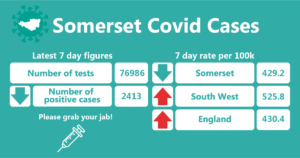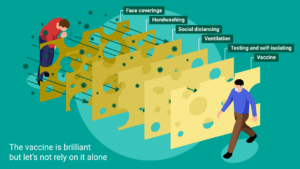Welcome to the latest edition of the weekly Somerset Covid-19 update for key stakeholders. This update is produced on behalf of the Somerset Covid-19 Engagement Board and is designed to provide a weekly update on the current Covid-19 situation in Somerset.
The number of cases of Covid-19 in Somerset has slightly decreased this week and about half of our cases are now among school and college-age children as well as staff within education settings. You can read the detailed schools’ message later in this update.
The advice around asymptomatic testing has changed this week and we discuss it in more detail in the testing section later. However, the main change is there is now a focus on testing with a LFD before a period of high risk – such as visiting a vulnerable person or attending a crowded event, but not routinely twice a week. This will mean some people will test less frequently, however it is expected, particularly in the run up to the festive period, many people will be testing more often. The testing guidance for children, parents and staff at schools remains unchanged. For more information visit the NHS website.
In the run up to Christmas there will be a lot of crowded outdoor events and markets happening which also means more opportunities to spread Covid-19 if we don’t take simple precautions to minimise the risk of spread. Wearing a well-fitting face covering significantly reduces the risk of spreading Covid-19, and the more of us who do it, the more likely it is others will too. So, if organising an event, please set expectations and lead by example, with everyone who is part of the event (such as stallholders, staff and volunteer marshals) wearing face coverings as much as possible. And please make sure any advance publicity politely asks people to wear one.
We can all reduce the risk of passing on Covid-19 by taking a LFD test before going to any events, staying away if we test positive, and isolating at home while we await a PCR test result.
The simple hygiene measures we all applied so well earlier in the pandemic are just as important now with infection levels still high in the community. Please keep your distance from others, if possible wear a face covering if in crowded or enclosed spaces and remember to wash your hands as soon as you get home. When in indoor spaces ensure there is good ventilation or perhaps meet up outside if possible.
Latest Covid Dashboard: The following link below will take you to our website: Coronavirus (COVID-19) (somerset.gov.uk) Then scroll down the page until you get to ‘COVID-19 Dashboard’ in the list. Click on this and the dashboard will open.
‘Remember, everyone can catch it, anyone can spread it’.



| David Fothergill, Leader of Somerset County Council Twitter: @DJAFothergill | Trudi Grant, Director of Public Health Twitter: @SomersetDPH | Clare Paul, Cabinet Member for Public Health and Wellbeing Twitter: @Clarepaul_ |

In the week up to 21 November, approximately 76,986 tests were carried out across the county with 2,413 new confirmed cases. The rates have decreased slightly in the last reporting week to 429.2 per 100.000. This is below both the South-West and the national average.
Hospitalisation data for Somerset has decreased to around 45 Covid-19 in-patients in Somerset hospitals.
This Week’s Headlines:
The main items featured in this week’s update are:
- Workplace, Care and School settings
- Vaccinations Update
- Testing Update
- Christmas Planning
- Latest Covid Catch-up Film
- Resources and further information
Workplaces: We are still seeing sporadic outbreaks occurring as people socialise in and around the workplace. We continue to support these settings by providing public health advice and guidance around stopping the spread and reducing transmission.
As mentioned in the introduction, and outlined in the testing section later in this this update, there have been some changes to the guidance for LFD testing. Employees are at higher risk of catching or passing on Covid-19 in crowded and enclosed spaces, where there are more people who might be infectious and where there is limited fresh air.
Staff will be encouraged to take a rapid lateral flow test if they expect there will be a period of high risk that day. For example, if staff have to work closely together for a particular task or staff attending the workplace for meetings.
In addition to testing, getting vaccinated and continuing to take other preventative measures such as regular hand washing, wearing a face mask and when meeting work colleagues indoors keeping a window open to ventilate the space reduces the risk of spreading the virus.
Find out more about what you can do to keep working safely to reduce the risk of transmission via the HSE website.
Care Sector: Somerset County Council continue to see cases and outbreaks of Covid-19 in our social care settings. Infection Prevention Control (IPC) measures are essential to reduce the risk of Covid-19 as well as other infections. Good IPC practices require continuous monitoring and regular staff training is key to prevent not only Covid-19 but other winter infections. Regular testing, vaccination promotion, ventilation, monitoring for a wide spectrum of symptoms and prompt action where infection is suspected is essential, as well as promotion of health and wellbeing for both people we care for and staff.
Emotional support: Somerset County Council recognise the huge effect the prolonged efforts of caring for our most vulnerable people have been on care staff in all areas. Support is available for care workers in Somerset – take a look at the dedicated online resource for all health and care workers in the Somerset Emotional Wellbeing Staff Hub. See also the support which is available via the Mental Health at Work website.
Guidelines updates:
A few recent updates in guidelines:
- Covid-19: guidance for supported living – updated 22 November 2021
- Restricting workforce movement between care homes and other care settings – updated 23 November 2021
- Infection prevention and control for seasonal respiratory infections in health and care settings (including SARS-CoV-2) for winter 2021 to 2022 – updated 24 November 2021
- Guidance on care home visiting – updated 25 November 2021
Covid-19, Flu and other seasonal respiratory infections
- Despite a negative test for Covid-19, individuals may have another infectious illness like flu. Action may still be needed to limit transmission including using appropriate PPE when working with symptomatic care home residents and isolation while the individual is unwell.
- Please contact our local Health Protection Team (HPT) at UK Health Security Agency (UKHSA) on 0300 3038162 or [email protected] for one or more confirmed cases of Covid-19 or two or more individuals with fever of 37.8 or above, respiratory symptoms or a sudden decline in physical or mental ability.
- The HPT will advise if additional testing is needed (including flu testing) and how to access this testing. If you have multiple people with symptoms, don’t wait until receiving the Covid-19 PCR result before contacting your HPT. Interventions including flu antivirals are more effective the earlier they are started.
Further information
More information about Covid-19 in care settings can be found on the Adult Social Care webpage.
Schools and Early Years settings: Directors of Public Health (DsPH) across the South-West have met and agreed that, given rates of Covid-19 in the South-West remain the highest in the country, it is appropriate to continue with current Covid-19 response measures in place, until the end of this term. More information can be found on the Support Services for Education (SSE) website.
In line with this consensus agreement, Trudi Grant, Director of Public Health for Somerset, advises educational settings, to keep in place the following control measures, as advised by Somerset County Council Public Health team on 11 November, unless an individualised letter is received:
- Continue to use face coverings in secondary schools in communal areas such as corridors, when movement occurs between lessons and on school transport if used
- Reduce mixing between groups of students as much as possible. Consider pausing regular ‘whole school’ assemblies and other “large gatherings” indoors
- Promote social distancing and reduce crowding where possible; minimise pinch points in the school day, for example, staggered lunch times, or start times
- Reinforce social distancing and good infection prevention control amongst staff (ventilation and touchpoint cleaning especially in areas where staff gather)
- Any close or household contacts of confirmed cases of Covid-19 to book a PCR test and whilst awaiting test results, undertake a daily LFD test and only attend school if this is negative- this includes students of primary age under parental discretion. The new LFD tests are nasal swabs only and much easier to use than previous stocks
To read the full article please visit the SSE website.
Public Health information will also be published on the Covid-19 School Toolkit | Support Services for Education. Individual, or urgent communication may still be required and in this case SCC PH will contact schools direct as required.
Covid-19 Educational Webinar Every Thursday: The South-West Health Protection Team continue to run free weekly Covid-19 educational setting webinars, which all educational settings are welcome to attend. The sessions will cover infection prevention principles and then discuss scenarios to illustrate this.
Primary school testing: We continue to see a rise in cases in primary schools in Somerset, therefore it’s important we continue to encourage, household, parent and staff LFD testing. Please also be aware Public Health could advise daily LFD testing for certain groups during an outbreak.
Any close or household contacts of confirmed cases of Covid-19 to book a PCR test and whilst awaiting test results, undertake a daily LFD test and only attend school if this is negative – this includes students of primary age under parental discretion. The new LFD tests are nasal swabs only and much easier to use than previous stocks.
Advice for Parents Collecting Children: If a parent or guardian has received a positive PCR test, by law, they must self-isolate at home for the full 10 day period. We remind all parents that collecting children from school is not an exemption to self-isolation.
Somerset County Council encourage all parents to have a friend or neighbour in mind who they could ask to do the school run ‘just in case’, to help avoid breaking self-isolation rules by leaving home.
Symptomatic and Asymptomatic Testing: The reporting of both positive and negative tests is important to help us understand the spread of the virus and should be encouraged, please remember to report your results via the GOV.uk website.
Current guidance remains – parents or carers of a school or college age child, health, care or education staff are requested to undertake twice weekly asymptomatic testing using LFDs.
If staff or a pupil is identified as a close contact, they may be asked to take daily lateral flow device (LFD) tests, while they wait for their PCR test result. In this scenario, the staff member or pupil should continue to attend school or college as long as their LFD test results remain negative and they feel well.
SCC PH advice remains consistent with national guidance:
- Only use twice weekly LFD testing for asymptomatic cases
- Make sure you do an LFD according to the instructions and at least 30 minutes after eating or drinking or vaping
- If you get a positive LFD or have symptoms get a PCR and use the supervised PCR testing route at test centre to get the best quality test
- Encourage secondary school age children to wear face coverings in crowded or enclosed places, for example on school transport. You can download posters to help encourage uptake via the SSE website.
- Take up the offer of vaccination
If you think your child is a close contact but has not been contacted directly by NHS Test and Trace then they should take a PCR test via the GOV.uk website or by calling 119.
When ordering a PCR test it is important to check the box (online) or tell 119 ‘I’ve been told to get a test by my health protection team’ and not ‘I’ve been told to get a test by my school or nursery’
Childhood Immunisation Programme: The Somerset Foundation Trust manage the childhood immunisation programme with SAINT (School Age Immunisation Nursing Team, part of the NHS). SAINT deliver the nasal flu vaccination to all schools in Somerset between October and December every year.
This year, the Covid-19 and flu vaccines are being rolled out together for 12-15 year olds through the schools immunisation programme. If your school has a slot booked for flu vaccinations and for Covid-19 vaccinations, they should keep both slots.
Immunisation sessions should still go ahead as planned when a school has a Covid-19 outbreak, unless specifically advised not to by a health protection team (HPT) or Director of Public Health (DPH). Other factors which may impact on the ability to offer immunisation sessions include the number of children still in school and whether the school has had to send some year groups home or close due to lack of staff.
SAINT will work with the school to ensure children who missed vaccinations because they were self-isolating at home or for other reasons, including exclusion, or missed consent deadline are re-offered immunisation at an appropriate time in the future. More information is available on the NHS website.
A full range of resources and information can be found on the SSE website.
Covid-19 Vaccine Programme: Most schools should now have confirmed dates scheduled for a visit from their School Age Immunisation Service (SAIS) team.
Special school staff are eligible for Covid-19 boosters. This will need to be 180+1 days from the second dose but staff should be able to book on the National Booking System.
Where special schools only had 48 hours consent and therefore missed the deadline, pupils will be invited to Firepool in Taunton or the Haynes Motor Museum vaccination centres. Special schools will be contacted by SAINT to discuss practicalities.
12-15 year olds who have missed their school vaccination date (due to absence or illness) are advised to book their vaccination online. You now need to wait 12 weeks until after you tested positive for Covid-19 before you can be vaccinated. To book or manage your vaccine, please visit the NHS website.
Bookable slots for 12-15-year-olds: There are a significant number of bookable slots for 12 -15-year-olds at vaccination centres at, Somerset Motor Museum in Sparkford and Firepool in Taunton. You can book through the National Booking Service online or by calling 119.
Please note: If you’ve had a positive Covid-19 test, you need to wait 12 weeks before having your vaccination. This starts from the date you had the test
The vaccine is not mandatory; the decision to have the vaccine is a personal decision. The role of schools is to facilitate access for those who wish to receive the vaccine.
Vaccination Update: This weekend (25- 28 November), the NHS are holding extra clinics across Somerset in order to give local people more opportunities to get their Covid-19 vaccinations. Some of these walk-in clinics are taking place in new pop-up locations across Somerset. You can view these on the NHS website.
12-15 Year Olds: More than one million 12-15 year olds have been vaccinated against Covid-19, gaining extra protection for themselves and their families.
The NHS is offering the life-saving jab through schools across the country. Young people are also able to access their jab at hundreds of existing vaccine centres, including GP practices and community pharmacies. To do this, young people or their responsible adults can visit the NHS website or by calling 119. There are also convenient walk-in options across the country, which you can find on the NHS website.
16-17 Year Olds: Most 16- and 17-year-olds have now got their NHS Covid-19 vaccine. This is important protection for them and their families – infection rates for this virus are still high, and scientists still don’t fully understand the long-term damage it can do to people.
Getting the vaccine takes just a few minutes and, if you’re between 16 and 17, it’s never been easier. You just need to visit the NHS website or call 119 for an appointment. There are also convenient walk-in options across the country, which you can find on the NHS website.
You don’t need to be registered with a GP or have an NHS number to get your jab, but it will be quicker if you do, so take this information with you if you can.
Boosters: The Covid-19 booster vaccine is now available to ensure you have continued protection over the winter.
If you’ve had a first and second dose of the Covid-19 vaccine over six months ago and are
- over 40
- with a health condition which puts you at high risk from Covid-19
- living with people at high risk of getting infection
- a carers
- frontline health and social care workers.
You can get your booster vaccine visit the NHS website or call 119 for an appointment. There are also convenient walk-in options across the country, which you can find on the NHS website.
Eligible people can pre-book an appointment from five months after their second dose through the national booking service. They will be offered an appointment six months after their second dose.
Flu vaccinations are also available and if you’re eligible for a Covid-19 booster you may be offered them at the same time. There is generally no problem having them together and it will save you an extra trip! But don’t delay your appointment; the most important thing is to get protected as soon as possible. More information on the flu vaccination, please visit the NHS website.
Evergreen offer: The Covid-19 vaccines are safe and effective. They give you the best protection against Covid-19.
If you haven’t had your first or second dose yet, you can still get it by booking through the NHS national booking service or by attending a walk-in clinic.
If you are eligible, you can get your vaccine at any time, even if you have been offered before but haven’t yet had it. Like any medicine, although the vaccine can cause some side effects, not everyone gets them. If you do, they are usually mild and do not last for very long. Getting the vaccine is the best protection for you and your loved ones.
Testing Update: Last week, there was an update to the asymptomatic testing guidance, where members of the public in England are encouraged to take a rapid test before a period of high risk, replacing the advice to take rapid flow tests twice weekly. The definition of being at a higher risk refers to the risk of catching or passing on Covid-19 when in crowded and enclosed spaces. These are spaces where there are more people who might be infectious and where there is limited fresh air. The other area of risk is if you are visiting people who are at a higher risk of severe illness if they were to be infected with Covid-19.
It is important to note healthcare settings, social care, schools and prisons will retain their own testing guidance, and you should make sure you are aware of this guidance if you visit or work in these places.
With around one in three people with Covid-19 showing no symptoms, the virus could be passed onto others without knowing. With fewer restrictions in place this winter following the success of the vaccination programme, the act of refreshing air in the home when people have visitors, testing before higher risk events and wearing face coverings when in enclosed spaces, is even more important for everyone to keep infections down.
Faulty PCR test kits: There have also been reports of people receiving home testing PCR kits, where the seals on the testing packs have been broken. This has been reported to the UK Health Security Agency (UKHSA). In the meanwhile, please discard any testing kits you receive which have a faulty seal and order a replacement, until the issue is rectified.
Christmas Planning – Work Events: We are now entering the period when Christmas parties might be being planned and there are a few simple things which should be considered in these plans to help reduce the chance of catching and spreading Covid-19.
People should consider meeting in smaller groups rather than holding large events and also wearing warm clothes to allow them to meet outdoors. If the party has to take place inside, please open a window to let in fresh air and stop the spread of the virus.
And don’t forget to take a LFD test before the party and do not attend if feeling unwell, and, finally, guests should wear a face covering when indoors or in a crowded space.
Covid Catch-up Film: In this week’s Covid Catch-Up film, we discuss the fact the vaccine, brilliant as it is, is not the only defence we have against the spread of Covid-19.
Our own lifestyle choices play a big part, so even if vaccinated, we should all try to keep ourselves and each other safe. Simple ways to do this include wearing a face-covering in crowded and enclosed spaces, ensuring there is good ventilation when meeting inside, washing our hands regularly and continuing to take regular lateral flow tests. Also, if people are unwell they should self-isolate, not mix with others and book a PCR test. The film can be viewed on YouTube.

Resources and further information: Please do keep an eye our Healthy Somerset website, which has a huge amount of information and resources to help keep everyone healthy happy and safe at this time.
For the latest local information as well as digital resources, posters and flyers please visit the Somerset County Council website.
The Somerset Local Outbreak Management Plan outlines how we, the council, will work with the NHS Test and Trace Service, PHE, the NHS and other partners to ensure a whole system approach to preventing and managing local outbreaks. This can be found here.
Finally, please like them on Facebook, follow them on Twitter and share their posts with your networks to help them in communicating these important messages. Follow their Director of Public Health Twitter account too.

